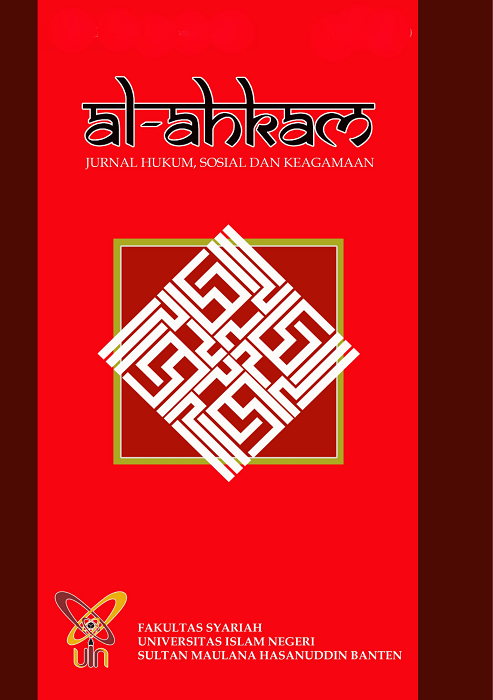Mapping of Responses to Tunisian Islamic Family Law Issues; Regulatory Study of Equal Inheritance Rights of Men and Women
DOI:
https://doi.org/10.37035/ajh.v18i2.7439Keywords:
Inheritance, Tunis, Equality, Majallah al Aḥwāl Asy SyakhṣiyyahAbstract
This article discusses the issue of equal inheritance rights between men and women which has long been the subject of discussion in Islamic inheritance studies. It is interesting because the discussion focuses on the context of the Tunisia which is known to have a progressive positive law. This is reinforced by the existence of a draft amendment proposal to Article 146 of Majallah al Aḥwāl Asy Syakhṣiyyah (MAS) with the title Aḥkām Tata'allaqu bi at Tasāwiy fī al Mīrāṡ. This article aims to map the responses that emerged from the proposed amendment to article 146 of the MAS, the motivation behind the responses, and the implications for efforts to equalize the rights of men and women in inheritance in Tunisia. Comparative approach used in this article, which is supported by historical and political studies to deepen the findings. The death of Beji Caid Essebsi is considered the main factor in the stagnation of the legal process for the amendment of Article 146 MAS, in addition, the strong response from conservative groups who do not agree with the amendment also has a big impact. This is reinforced by the statement of the current government of Tunisa which tends to stick more to the principles of Conservative Fiqh and views the proposal as a violation of Islamic law (sharia).
Downloads
References
“An-Nahḍa at-Tūnisiyya.” n.d. https://www.aljazeera.net/news/arabic/2018/8/27/النهضة-هذا-موقفنا-من-قضية-المساواة.
Anshori, Isnan. n.d. “Dua Banding Satu: Hikmah Dan Alternatifnya.” https://rumahfiqih.com/y.php?id=254.
“Beji Caid Essebsi ‘The Shadow of Bourguiba.’” n.d. https://www.alquds.co.uk/الباجي-قايد-السبسي-ظل-بورقيبة-الذي-زا/.
“Bochra Belhaj.” n.d. https://majles.marsad.tn/ar/person/bochra-belhaj-hamida.
Clark, Janine A, and Samah Krichah. 2021. “Secular Feminism in Tunisia: A Political Generations Approach.” Globalizations, 1–17.
Grami, Amel. 2018. “Women, Feminism and Politics in Post-Revolution Tunisia: Framings, Accountability and Agency on Shifting Grounds.” Feminist Dissent, no. 3: 23–56.
J. N. D. Anderson. 1958. “The Tunisian Law of Personal Status.” International and Comparative Law Quarterl 7: 262–79.
Kebsi, Jyhene. 2022. “From Bourguiba to Ben Ali: The Failures of State Feminism in Tunisia.”
Komarudin. 2019. “Hukum Keluarga Di Tunisia Dan Indonesia (Studi Syariah Dalam Konteks Negara-Negara Modern Di Dunia Islam).” Kordinat XVIII, no. No 1: 194–225.
Marzouki, Abou Yaareb. 2015. “Individual Freedoms and Equality Committee Forced ‘Clash of Civilisations.’” 2015. https://www.middleeastmonitor.com/20180716-tunisias-marzouki-individual-freedoms-and-equality-committee-forced-clash-of-civilisations/.
Mukhtar Zamzami. 2012. “Kajian Hukum Terhadap Kedudukan Dan Hak Perempuan Dalam Sistem Hukum Kewarisan Indonesia Dikaitkan Dengan Asas Keadilan Dalam Rangka Menuju Pembangunan Hukum Kewarisan Islam.” Universitas Padjadjaran.
Paul Reuter. n.d. “Reuters.” https://www.reuters.com/.
Powers, David S. 1993. “The Islamic Inheritance System: A Socio-Historical Approach.” Arab Law Quarterly 8, no. 1: 13–29.
Ratih Lusiana Bancin. 2018. “Hukum Keluarga Islam Di Tunisia.” Penelitian Medan Agama 9, no. 2: 283–308.
Robin, Al. 2018. “PROBLEMATIKA HUKUM PEMBAGIAN WARIS 2:1 DALAM PENDEKATAN TEORI QATH’I ZHANNI.” Sangaji Jurnal Pemikiran Syariah Dan Hukum 2, no. Nomor 1: 108–33.
Sriani, Endang. 2018. “Fiqih Mawaris Kontemporer: Pembagian Waris Berkeadilan Gender.” TAWAZUN: Journal of Sharia Economic Law 1, no. 2: 133–47.
Ṭāhir Ḥaddād. n.d. Imroatuna Fi Ash- Sharī’ah Wa Al-Mujtama’. Tunis: Dār Muhammad Ali Li An-Nashr Sfax.
“The Controversy over the Marriage of a Tunisian Woman to a Non-Muslim.” n.d. https://www.alaraby.co.uk/عودة-الجدل-حول-زواج-التونسية-بغير-المسلم.
“Tunisia: Pact for Equality, Individual Freedom.” n.d. https://www.hrw.org/news/2018/07/24/tunisia-pact-equality-individual-freedom.
“Tunisian Marriage to a Non-Muslim between Acceptance of the Law and Rejection of Religion.” n.d. https://www.independentarabia.com/node/134536/سياسة/تقارير/زواج-التونسية-من-غير-مسلم-بين-قبول-القانون-ورفض-الدين.
“Wawancara Bochra Belhaj.” n.d. https://www.mc-doualiya.com/chronicles/مقابلة/20190814-بشرى-بالحاج-حميدة-قانون-المساواة-في-الميراث-دليل-على-أن-حقوق-المرأة-تطورت-في-تونس.
“Zaghouan, Tunisia.” n.d. http://www.zaghouan.tn/index.php?option=com_content&view=article&id=270&Itemid=129.
عبيد الله بن الحسين بن الحسن أبو القاسم ابن الجَلَّاب المالكي. 2008. التفريع في فقه الإمام مالك بن أنس - رحمه الله -. الطبعة: ال. بيروت - لبنان: دار الكتب العلمية، بيروت - لبنان.
قناة الحرة. n.d. “اقتراح تعديلات قانونية تنص على المساواة التامة بين الرجل والمرأة في تونس.” https://www.youtube.com/watch?v=WLsgKegkiPI.
“مسيرة نسوية بتونس تطالب بالمساواة في الميراث.” n.d. https://www.aljazeera.net/news/arabic/2018/3/10/مسيرة-نسوية-بتونس-تطالب-بالمساواة-في.
Downloads
Published
Versions
- 2023-01-24 (3)
- 2022-12-31 (2)
- 2022-12-31 (1)
How to Cite
Issue
Section
License
Copyright (c) 2022 Auliya Ghazna Nizami

This work is licensed under a Creative Commons Attribution-ShareAlike 4.0 International License.










